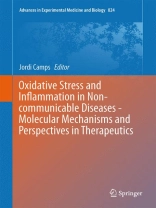Oxidative stress and inflammation underpin most diseases; their mechanisms are inextricably linked. For example, chronic inflammation is associated with oxidation, anti-inflammatory cascades are linked to decreased oxidation, increased oxidative stress triggers inflammation and redox balance inhibits the inflammatory cellular response. Whether or not oxidative stress and inflammation represent the causes or the consequences of cellular pathology, they contribute significantly to the pathogenesis of non-communicable diseases. The incidence of obesity and other related metabolic disturbances are rising, as are age-related diseases due to progressively aging populations. Interrelations between the mechanisms of oxidative stress and of inflammatory signaling and metabolism are, in the broad sense of energy transformation, being increasingly recognized as part of the problem in non-communicable diseases.
The book Oxidative Stress and Inflammation in Non-communicable Diseases: Molecular Mechanisms and Perspectives in Therapeutics is an update on the latest research on the molecular basis of non-communicable diseases and the search for possible therapeutic alternatives. The authors of this monograph are experts in their field and the book as a whole, provides an overview of the biochemical alterations underlying diseases such as cardiovascular disease, cancer, obesity, renal disease, neurological diseases and diabetes, emphasizing those aspects that they share in common. We hope that this book will be useful for researchers in biomedicine and also for physicians interested in finding the root causes of the disease, as well as for post-graduate students in biochemistry, molecular biology, nutrition or medicine.
Tabla de materias
Oxidation and inflammation, a molecular link between non-communicable diseases.- Oxidative stress and DNA damage in obesity-related tumorigenesis.- High density lipoproteins and ischemia reperfusion injury: The therapeutic potential of HDL to modulate cell survival pathways.- The DING family of phosphate binding proteins in inflammatory diseases.- Inflammation, infection, cancer and all that…The role of paraoxonases.- Autophagy is an inflammation-related defensive mechanism against disease.- Delta-5 and Delta-6 Desaturases: crucial enzymes in polyunsaturated fatty acid-related pathways with pleiotropic influences in health and disease.- Systemic inflammation, intestine and paraoxonase-1.- Serotonin modulation of macrophage polarization: inflammation and beyond.- Energy metabolism and metabolic sensors in stem cells: The metabostem crossroads of aging and cancer.- Molecular promiscuity of plant polyphenols in the management of age-related diseases: far beyond their antioxidant properties.- Postprandial Inflammation: Targeting glucose and lipids.- Dynamic interplay between metabolic syndrome and immunity.- The axis AGE-RAGE-soluble RAGE and oxidative stress in chronic kidney disease.- The chemokine (C-C motif) ligand 2 in neuroinflammation and neurodegeneration.












